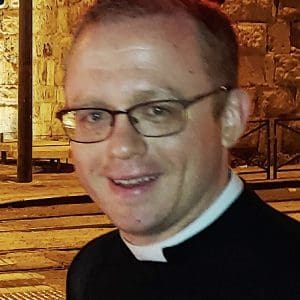As stated before in Part I and Part II, there is a clear pastoral need for sound spiritual directors in the church who are both priests, religious, and lay faithful with solid formation. We will continue our conversation on what are the various vocational and ministerial scenarios in that regular spiritual direction is needed in light of one’s vocation, charism, ministry/apostolate, or full-time employment.
III) When do I need life-long, vocationally-based spiritual direction?
It is irrefutable that every follower of Jesus needs spiritual direction in their lives according to the workings of grace, Divine providence, individual needs, and circumstances. There are scenarios where members of Christ’s faithful have a need for regular, consistent, life-long spiritual direction. This is because the Lord has moved them to discern or placed them providentially in a position of authority and leadership within the Church, especially through Holy Orders and Consecrated Life. With lay people, the Lord may also call them to embrace a particular charism or ministry that leads them to leadership positions within the church. This call to leadership will lead them to see the Church up close and personal in a way in which they see the beauty of some elements of her humanity cooperating with divine grace. They will also see the wound of concupiscence and sin at play in the darkness of some elements of her humanity that are still struggling against it or even enslaved to it. (cf. Song of Songs 1:5; Mt 24:42-51, 25:1-46; Mk 13:34-37; Lk 12:35-48, 19:11-27)
Because of this reality, there is a need for pastoral care and accompaniment that is objective, unbiased, dispassionate, and attentive to spiritual and personal needs that arise in a way that is faithful to the mission and teaching of the church. Such accompaniment within spiritual direction will help those involved hear and respond to the voice of God calling in their lives. This is why there has always been a need to separate individual pastoral care for souls from those who work alongside the pastors of the church directly in the mission of the Church. Here is where these scenarios play out within the lives of individual believers:
When one is in formation in seminary for the priesthood or in religious life (See Congregation for Clergy, The Priest, Minister of Divine Mercy, n. 66-69, 87-97, 125-134; John Paul II, Pastores Dabo Vobis and Vita Consecrata; Francis, Vultum Dei Quaerere; Second Vatican Council, Presbyterorum Ordinis, Optatam Totius, and Perfectae Caritatis; USCCB, Program for Priestly Formation, Sixth Edition, Congregation for Clergy, Ratio Fundamentalis Institutiones Sacerdotalis.)
When one is called by God to be a bishop, priest, deacon, religious, or enter consecrated life. (See Congregation for Clergy, The Priest, Minister of Divine Mercy, n. 110-116, 117-121; John Paul II, Pastores Dabo Vobis and Vita Consecrata; Francis, Vultum Dei Quaerere; Second Vatican Council, Presbyterorum Ordinis, Optatam Totius, and Perfectae Caritatis; Congregation for the Clergy, Directory for the Ministry and the Life of Priests)
When one is called to embrace the living of a spiritual charism outside the setting of religious life: A charism is a gift of the Holy Spirit given in a particular way to an individual or to a group for the purpose of building up the Kingdom of God in holiness, love, and truth. He does this for the good of the Church and the souls of those engaged in the charism. A charism, in the context of religious or consecrated life, is the personality of a religious community bequeathed by the founder in holiness and how they knew, loved, and served Christ in a particular way in their life through the power of His grace. According to the Second Vatican Council, a charism is “the spirit and aims of each founder [which] should be faithfully accepted and retained” (Second Vatican Council, Perfectae Caritatis, n. 2; See also John Paul II, Christifideles Laici, n. 24, 45, 55; CDF, Iuvenescit Ecclesia – On the Relationship between the Hierarchical and Charismatic Gifts in the Life of the Church) Lay people who are married, privately consecrated, or currently discerning their vocation, as well as diocesan priests can often be called by God to embrace the living of a particular spiritual charism within the larger context of their primary vocation. It is also a manifestation of a particular call to love and honor God through embracing particular forms of prayer, penance, and acts of service within the life of the Church as an individual member of the baptized faithful. This is often seen in communities such as Third Order Carmelites, Secular Franciscans, Third Order Dominicans, Benedictine Oblates, or clerical/lay ecclesial movements and families such as Apostoli Viae, Communion and Liberation, Focolare, Opus Dei, or the Beatitudes.
When one is serving Jesus and the Church through full-time work and ministry in Her life as a member of the lay faithful. This can include various forms of ecclesial or charitable service in the areas of ministry or an apostolate. These often include:
- A High School or College Religion/Theology Teacher
- A Catechist/RCIA Teacher
- A Mentor Couple assisting priests in preparing couples for the Sacrament of Matrimony
- A Parish Religious Education Director
- A Parish RCIA Director
- A Parish Youth Minister
- A Parish Music Director
- A Missionary
- A Volunteer who regularly serves the poor, sick, or needy in the name of Jesus and His church.
- A Leader of a religious-based group that focuses on Catechetics, Evangelization, Spiritual and/or Faith Formation, or the promotion of some aspect of the mission and life of the Church
- A Full-Time Spiritual Director
- A Small Group Leader
- Exorcism and Deliverance Ministry
These ministries and apostolates are ways in which people in the Church make the Gospel known and lead others to know, love, and serve Jesus and respond to Him through the life of faith. In embracing such ministries there can be many joys and challenges. I cannot look for priests, religious, or lay people who I work for or collaborate with in ministry to give me spiritual direction. I should try to develop a healthy working relationship and possible friendship with those whom I work with directly. For proper pastoral care of my soul, I will have to find guidance from another priest or person in spiritual direction whom I do not work for who is faithful, well-formed, holy, and whom I can trust to be an objective voice to help me be faithful to Jesus and discern His will.
Often when I work within the humanity of the Church, I can find that familiarity can breed contempt if I am not careful. There can be a temptation of only treating the faith as a job and not as a relationship with the Lord that leads me to holiness, healing, and salvation. This is why if I am not living out basic practices of faithful discipleship in the interior life (see Part 2) I can fall into practical atheism, in which I reduce my faith to merely what I do to get a living, and I live the rest of my life as if God didn’t exist and that holiness was an impossible ideal that really didn’t matter.
When one discerns one is called to an online media apostolate and is posting content on social media or the internet in the forms of articles, videos, reels, or podcasts. Spiritual direction in this context should be to make sure content is consistent with the constant teaching of the Church on faith and morals, conducive to moral virtue, charitable, edifying, and uplifting. The rise of the use of social media within the life of the Church has created new pastoral problems that the Church has yet to fully grasp and give proper accompaniment.
When in one’s interior life and prayer the Lord manifests supernatural charisms through visions, revelations, prophetic utterances, or other extraordinary mystical phenomena on a regular basis. The Church teaches that:
“When extraordinary cases arise or extraordinary phenomena occur, these must be referred to the spiritual authors and to the great mystics. It has to be remembered that such phenomena can derive from natural sources, or from psychological and cultural sources as well as from formation and social contexts. The Church has established criteria to judge their authenticity. These criteria are based on doctrinal content (illuminated by the Sacred Scriptures, the Sacred Tradition and the Magisterium) and on honesty of the persons involved (especially their sincerity, humility, charity and mental condition) and on the permanent fruits of holiness.” (Congregation for Clergy, The Priest, Minister of Divine Mercy, n. 95; Congregation for the Doctrine of the Faith, Norms Regarding the Manner of Proceeding in the Discernment of Presumed Apparitions or Revelations & Iuvenescit Ecclesia – On the Relationship between the Hierarchical and Charismatic Gifts in the Life of the Church; Second Vatican Council, Lumen Gentium, n. 7 & 12 & Apostolicam Actuositatem, n.3 & 30; John Paul II, Christifideles Laici, n. 20-21, 24, 64)
Concluding Thoughts
Every member of the church has some need for spiritual direction, which will vary according to their vocation and the various seasons of their lives. These needs will often vary with some people requiring more guidance than others. A challenge that many people face is the inability of priests or religious’ time to provide spiritual direction or the feeling that they lack proper training or that spiritual direction is not their charism. Sometimes they can even encounter spiritual directors who have poor training or lack the humility to listen and reverence the action of grace in people’s souls or come in with a self-driven ideologically driven agenda that is either self-serving or contrary to the basic teachings of the faith. In light of these difficulties, people do not seek the guidance of spiritual direction through the church either through priests, religious, or lay faithful because they do not know where to begin or because of limited resources. Another phenomenon that has added to this difficulty is the crisis of faith in the Church. This is rooted in the general observation found in many Catholic social media circles where many people feel that they cannot trust the pastors of the church because of sins that many of them in high-profile places have committed. This observation is fueled by two impressions, first that some of the more prominent pastors of the Church show complete indifference to proclaiming, guarding, and handing on of basic orthodox Catholic teaching and practice in varying aspects of her life. The second impression that fuels this impression is that some of these high-profile pastors of the church not only lack supernatural faith but openly promote sin and heresy. Such actions can feed into the impression that they are more concerned with worldly acclaim and popularity at the cost of losing their souls and selling out the soul and patrimony of the Church. (Cf. Mk 8:36) When teaching and practice that is consistent with right belief and right practice of belief applied to all aspects of the life of faith is asked by the faithful, some of these pastors often immediately dismiss them and ridicule them. A pastoral insensitivity and gaslighting tendency often come to play visibly when labels of rigidity, mental illness, disobedience, “lack of faith in the Holy Spirit”, and divisiveness are immediately applied to faithful with a refusal to dialogue or to accompany them in giving them the basic essential norms, teachings, and practices of Christian discipleship. This then wounds the lay faithful and exacerbates division in the church within herself and from Christ her head and from pastors and the faithful under their care due to human sinfulness. The faithful are left to their own devices and feel orphaned when they are alienated from pastoral care and accompaniment, thus running the risk of falling victim to a dangerous spiritual willfulness, an unbridled critical spirit, and prideful self-reliance that can undermine the salvation of souls. This wound is a reality that there needs to be a growing awareness with an acknowledgment of authentic needs, dangers, and excesses on multiple fronts while attempting to bring healing and repentance along the path of holiness that all members of Christ’s body are called to intimacy with Him.
This points to the fact that the faithful have a God-given right to orthodox, sound Catholic teaching both in spiritual direction and every aspect of the life of faith. It is in this that they are able to abide fully in the mystery of Jesus’ life present in their own lives and bear the fruit of holiness that He desires to bear in us. (Cf. Jn 15:4-5) This right and disposition avoid a false nostalgia for the past or idolatry of the present moment and experience of faith or prideful self-righteousness that only stops at knowing and following the right ideals of faith. This right is not rooted in rigidity nor is it complacent with sin but is linked with right worship and love of God and authentic love of neighbor and my obligation as a disciple of Jesus to help all get to heaven no matter where they may find themselves. When this is done by both pastors, spiritual directors, and faithful of all vocations in faith, hope, love, and humility, then the call to holiness shall flourish in the life of the Church. May God continue to bless and guide souls in the Church through sound spiritual directors of various backgrounds and vocations. We pray for their work to help all embrace the call to discipleship and holiness in living, lighting, and leading the way to union with Jesus in our world today may continue to bear abundant fruit.
For more information on the importance of spiritual direction and how it may apply to you in your particular vocation, please consult Navigating the Interior Life, Spiritual Warfare and the Discernment of Spirits, The Devil in the Castle by Dan Burke, and Spiritual Direction: A Guide for Sharing the Father’s Love by Fr. Thomas Acklin, OSB and Fr. Boniface Hicks, OSB.
Image: DepositPhotos




